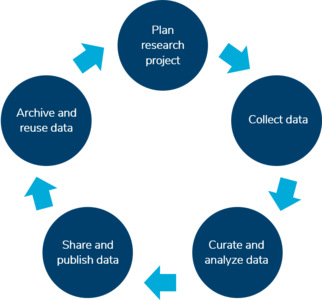Research data management
Contact
General enquiries
fdm-task-force@uol.de
Research Data Management, DARE, Open Access - BIS
fdm-support@uol.de
Open Science - Department for Research and Transfer
openscience@uol.de
Scientific Computing - School V
fdm-fk5@uol.de
Research Data Management for Medicine and Health Sciences - School VI
fdm.fkvi@uol.de
Research data management
On this page you will find information about research data management at the Carl von Ossietzky University of Oldenburg (UOL). Gain an overview of the services offered, the team, events and the networks in which the UOL is involved.
What is Research data management?
Research data management (RDM) involves planning, organising, securing and managing research data throughout the research cycle. It is an essential component of research that ensures the reusability of data and the traceability of results. Effective RDM helps to prevent data loss and ensure the integrity and reliability of research results.
Research data management at the University of Oldenburg
The basis for RDM at the UOL is the strategy paper on Handling Research Data at the UOL [pdf], which was adopted by the Presidential Board in 2020. This is anchored in the regulations on the principles for ensuring good academic practice and recommends that all scientists manage their research data sustainably in accordance with the FAIR principles.
FAIR principles
The term FAIR Data was explicitly coined by the Force11 and is being further established within the GO FAIR Initiative. In Germany, activities are currently bundled within the framework of the National Research Data Infrastructure (NFDI). The acronym FAIR is made up of the following terms:
F - Findable: To make data usable and reusable, one must be able to find it. For this, machine-readable metadata suitable for searching is important.
A - Accessible: Found data must be accessible, for instance by using appropriate authorisation management.
I - Interoperable: The (meta)data must be represented in a form that allows integration with other data and tools.
R - Reusable: To enable subsequent use of the data, suitable licences should be used and relevant domain/community standards should be met.
If you want to learn more about FAIR data check out How to Fair
RDM plays an important role at UOL and is dealt with across several structural levels. The Department for Research and Technology Transfer and the Library and Information System (BIS) deal centrally with the topic of RDM. In addition, the individual Faculties and Institutes, as well as major academic projects at the UOL, develop domain-specific solutions and advisory services. A university-wide, interdisciplinary working group provides the umbrella for these efforts.
Plan research project
- Data Management Plan (DMP): A DMP systematically describes how research data generated and/or used in projects will be handled. The BIS supports the creation of a DMP.
- Further education: The BIS offers training courses and consultations on all topics of research data management.
- Research funding: The Department for Research and Transfer advises on requirements of research funding bodies (forschungsdaten.info)
- Ethics: The Research Ethics Committee advises on ethical aspects of research projects.
- Data Protection Management and Information Security: The Data Protection and Information Security Management provides information on these topics.
- Fiduciary Office: The Fiduciary Office, which is currently being set up,supports personal research in compliance with data protection regulations.
- Research Information System (FIS): The introduction of a university FIS has started in 2023.
Collect data
Electronic Data Capture
- Online Surveys: Development and implementation of online surveys with LimeSurvey and SoSci Survey.
- Workflow Methodology(for FKVI): Browser-based, metadata-driven software REDCap for designing clinical and translational research databases.
- Capture patient data (for clinical trials): SecuTrial is a GCP-compliant EDC system for capturing patient data via eCRFs in clinical trials or non-interventional studies and patient registries.
Laboratory data management
- Electronic Lab Notebook (ELN): From 2024 on, the electronic lab notebook eLabJournal will be available to interested working groups.
Prepare and analyse data
- Software: The IT services offer access to various data analysis software, including MATLAB, MAPLE, MAXQDA, and SPSS.
- Academic service portal for Lower Saxony: The Academic Cloud, offers storage, file sharing, virtual communication and much more for universities, higher education or research institutions in Lower Saxony.
- High-performance computing: Support with software installations, the implementation of projects is offered by the Scientific Computing.
- Medical Data Integration Centre: Oldenburg MeDIC is being developed.
Archive and reuse data
- Data management: University members can use various data storage services provided by IT services. These are designed to be high-performance, fail-safe and disaster-proof.
- Metadata standards: A list of metadata standards is provided by theMetadata Standards Catalog.

